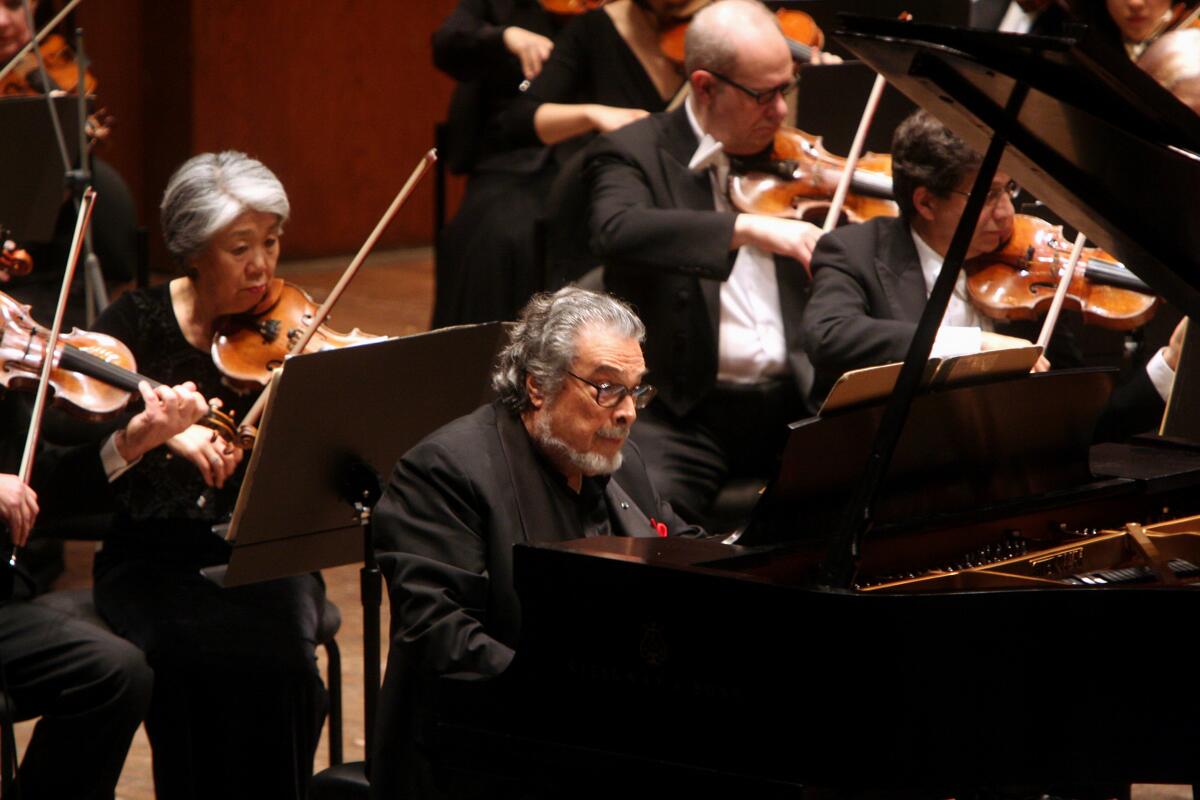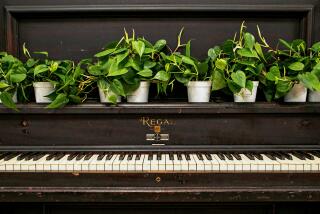Op-Ed: How isolation is a golden opportunity for musicians

The click of my heels on wood resonates through my living room. If I were to hear the sound of my own shoes when walking off the concert stage, it would mean that nobody clapped at the end of my performance.
In this case, I am walking from my piano to the iPad to monitor the livestream of my weekly living room concert, Corona Fridays. I press “stop video,” and the virtual applause appears in the form of small red hearts and blue thumbs up, floating on the screen. The sound of a live audience has turned into a silent cartoon.
For musicians, the move from actual concert hall to virtual concert hall signifies a change in our emotional relationship with music. One of the most narcissistic elements of modern society — streaming on social media — is allowing musicians to commune with their art form on an entirely different, intimate level.
One of my teachers, the great American pianist Leon Fleisher, who died on Aug. 2, is likely to have enjoyed the irony of this. Fleisher taught his students about playing music for music’s sake. He would ask us to shelve our virtuoso training and forget about filling large halls with the huge, sparkling sound we had been honing for years.
Instead, he would ask us to direct our focus inwardly, on the intent of the composer and the music’s deepest message. Beginning Schubert’s last piano sonata was like joining a river that flowed eternally. A Mozart concerto wasn’t made of notes but of champagne bubbles.
Music was more important than us and our individual problems, he taught us, and we were lucky to commune with it. These were not easy concepts to grasp immediately — they would take time and living. The mayhem of piano competitions and orchestra engagements beckoned to us, young pianists at the start of our careers. Taking time off this ladder to consider the music for its own sake was not easy. Now, years later, forced isolation provides us with this golden opportunity.
Suddenly, time to commune with the music is all we have. Performers cannot survive for long without a live audience and a stage, but the coronavirus quarantine is a sudden chance to recalibrate ourselves. Without the pressure to fill a large hall with sound or to practice for countless hours for a concert date, we are able to reach into the music for its own sake. We play for pleasure and share it, if and when we feel like it.
Fleisher often reminded us in our lessons that much of the music in the classical repertoire was not written to be performed in giant auditoriums, but smaller living room salons that demand an intimacy of sound. The pandemic, while forcing musicians to find new digital means to perform and teach, is propelling us back in time to the very spaces the music was meant for.
No longer projecting for thousand-seat auditoriums, opera singers are transmitting art songs from their homes, in the way lieder was intended. Concert pianists are once again unashamed to play from the score, as they did before Liszt instated the memorized piano recital.
Apps like Acapella make it possible to record separate chamber music parts and combine them. Technology and performance practice are joined as string quartets are streamed to home computers around the world. At the same time, composers are in more dialogue with performers through virtual platforms and inspired by technology to take greater risks, creating works such as “Full Pink Moon,” by Pauline Oliveros, directed by Sean Griffin.
After my livestream concert is done, I join a group of almost 40 piano students to teach a Zoom piano masterclass. Small squares, each with some version of a piano living room scene, fill the screen like a board game. A student plays a Rachmaninoff prelude, with flair unhindered by the bumps of a slow internet connection. We talk about the sound of bells and the incisive pianissimo of Rachmaninoff’s own playing, how he practiced in his house on Elm Drive in Beverly Hills and how he loved to drive. On gallery view, I watch dozens of young pianists google Rachmaninoff on their phones. In their own way, they will try to home in on the intent of the composer.
I miss the magic and spontaneity of sculpting the piano sound in a hall, as I project it out to an audience. Yet, as I consider the passing of Leon Fleisher during quarantine, I think there has never been a better time to reexamine music making for its own sake.
Inna Faliks is a concert pianist and professor and head of the piano department at UCLA Herb Alpert School of Music.
More to Read
A cure for the common opinion
Get thought-provoking perspectives with our weekly newsletter.
You may occasionally receive promotional content from the Los Angeles Times.










